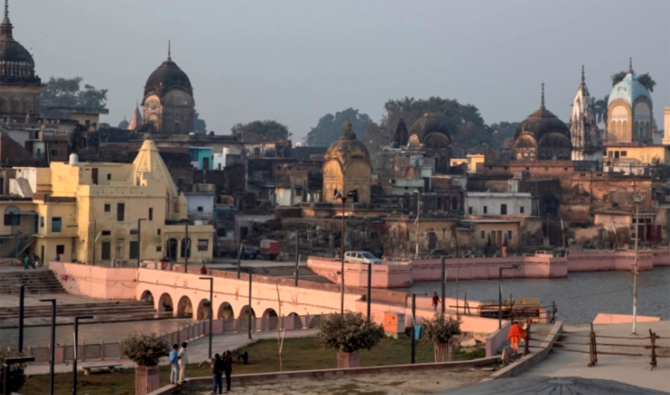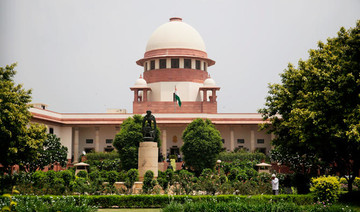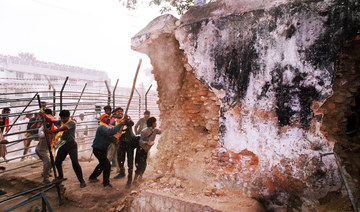NEW DELHI: Muslims in India fear a new wave of sectarian tension amid a controversial fundraising campaign to build a Hindu temple in place of a centuries-old mosque in the eastern city of Ayodhya in Uttar Pradesh.
The 16th-century Babri Mosque was claimed by both Hindus and Muslims. After decades of conflict, the Supreme Court ruled in favor of Hindus in 2019, allowing them to build a temple on the site where the mosque had stood.
The mosque was torn down by mobs mobilized by the now-ruling Bharatiya Janata Party (BJP) in 1992, which claimed that it was built at the birthplace of Ram, a major Hindu deity.
The destruction of the mosque sparked nationwide violence that claimed the lives of more than 2,000 people, mostly Muslims, and set the tone for sectarian tensions that continue today.
Last week, the World Hindu Organization, known locally as Viswa Hindu Parishad (VHP) — an affiliate of the BJP — launched a 45-day nationwide campaign to collect donations for the Hindu temple, including the Muslim community in its efforts.
“There is a palpable sense of anxiety among Muslims in the region,” social activist Abrar ul Haq, from the Basti area of Uttar Pradesh, told Arab News on Tuesday.
“Experience tells us that Hindu activists rally in a Muslim locality in the name of a campaign and shout provocative slogans to incite people. This leads to tension and violence,” he said.
“Muslims want to forget the temple debate, but the divisive campaign by Hindu groups makes them anxious.”
Before the VHP’s official fundraising campaign, smaller efforts to collect donations for the temple led to clashes in the Indore district of neighboring Madhya Pradesh in late December.
Saddam Patel, a resident of the mainly Muslim Chandan Kheri village in Indore, was injured in the violence along with his four brothers.
“We were inside our house, but the mob torched our other house. When we went there to save a sleeping child, they attacked us,” he told Arab News.
“They were armed with firearms and swords.”
Indore-based social activist Zaidi Pathan said that Muslim-dominated villages in the region are living in fear.
“Muslims have moved beyond the temple controversy, but the BJP cannot survive without religious polarization and tension. This is a deliberate strategy to keep communal tensions alive,” Pathan said.
However, the VHP blames Muslims for the violence.
“It is unfortunate that Muslims attacked the people who went inside the village to collect funds,” Surendra Kumar Jain, VHP general secretary, told Arab News on Sunday.
“Why are Muslims opposing the construction of a temple being built after the apex court’s order?” he asked. “It is the responsibility of the Muslim community to ensure that no such incident takes place anywhere in the country.”
Political analysts said that the BJP is using the temple issue for electoral purposes.
“There is a conscious attempt to politicize the issue and make sure that the Ram temple remains a relevant electoral issue,” Hilal Ahmed, of the New Delhi-based Center for the Study of Developing Societies, said.
Prof. Afroz Alam, of the Hyderabad-based Maulana Azad National Urdu University, believes that political mobilization regarding the temple would have happened regardless of the court’s ruling.
“I have always maintained that the temple campaign is more a political project than a spiritual one,” he said. “Whatever may have been the court’s judgment, political mobilization was bound to happen.”
New Delhi-based political analyst and writer Nilanjan Mukhopadhyay said that the fundraising campaign “demonstrates the BJP’s over-reliance on majoritarian campaigns to retain support.”
“At a time when pandemic-induced uncertainty is raging, the economy is virtually stagnant, and millions of Indians have little idea what future the future holds, what sense does it make to launch such a drive?” he asked.
“In 1989, the temple agitation got a new push and the BJP’s parliamentary tally went up from two to 85,” Mukhopadhyay said. “The temple controversy has played a major role in the rise of the BJP.”













